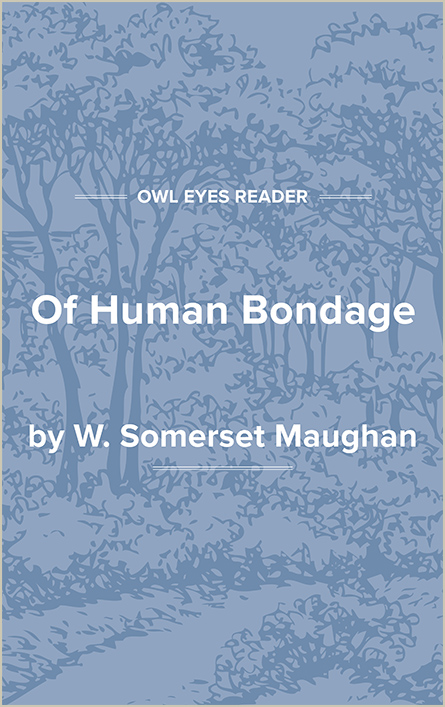Summary
Philip Carey is nine years old when his mother dies, and he is sent to live with his aunt and uncle at the vicarage of Blackstable, forty miles outside London. Uncle William Carey is a penny-pinching, smugly religious man who makes Philip’s life miserable. Having been born with a clubfoot, Philip is extremely sensitive about his deformity, and he grows up bitter and rebellious. The only love he is shown is given to him by his aunt, Louisa, who has never been able to have children of her own. At school, Philip’s clubfoot is a source of much ridicule, for the children are cruel. Philip is so sensitive that any reference to his foot, even a kind reference, causes him to strike out at the speaker.
When he is eighteen years old, Philip, with a small inheritance of his own, goes to Berlin to study. He takes a room in the home of Professor and Frau Erlin. There, he studies German, French, and mathematics with tutors from the University of Heidelberg. He meets several young men, among them Weeks, an American, and Hayward, a radical young Englishman. From their serious discussions on religion, Philip decides that he no longer believes in God. This decision makes him feel free; for in discarding God, he subconsciously discards his memories of his cold and bitter youth at the vicarage.
Shortly after his return to Blackstable, Philip becomes involved with a woman, Miss Emily Wilkinson, who is twice his age and a friend of Aunt Louisa. She is not attractive to him, but he thinks a man of twenty years of age should experience love. It is typical of Philip’s attitude that even after they become lovers he continues to call her Miss Wilkinson. Not long after the affair, Philip goes to London to begin a career as a clerk in an accounting firm. Dissatisfied, he works only a year; then he goes to Paris to study art. Two years later, he gives up the idea of becoming an artist and returns to London for his third great start on a career. He has decided to study medicine.
In London, Philip meets Mildred Rogers, a waitress. She is really nothing more than a wanton, but Philip nevertheless loves her and desires her above all else. He gives her presents that are extravagant for his small income, and he neglects his studies to be with her. She gives him nothing in return. When he asks her to marry him—seemingly the only way he can possess her—she tells him bluntly that he does not have enough money for her and that she is marrying someone else. Philip both loves her and hates her so much that he is almost consumed by his emotions.
In his affection for another girl, he starts to forget Mildred as she returns to London. Alone and penniless, Mildred tells him that the other man had not married her and that he already had a wife and children. Mildred is pregnant, and Philip forgets the other girl and takes Mildred back. He pays her hospital bill and her lodging bills and sends her to the coast to rest. Mildred repays him by going off for a holiday with a man Philip considers his good friend. They use Philip’s money to pay their expenses. Despising himself, he begs Mildred to come back to him after her trip with the other man; he cannot overcome his insane desire for her. Mildred, however, does not come back.
Philip then forces himself to study harder than ever. He meets Thorpe Athelney, a patient in the hospital where he is studying, and the two men become good friends. Philip visits the Athelney home almost every Sunday. It is a noisy house, filled with happy children, love, and kindness, and the cheerful atmosphere fills an empty place in Philip’s heart. One evening, Philip sees Mildred again. She is highly painted and overdressed, and she is sauntering slowly down the street with a vulgar swing of her hips. She has become a common streetwalker. Although Philip knows then that he has lost his desire for her, out of pity he takes her and her child into his home. Mildred is to act as his housekeeper. Because Philip’s funds are small, they are...
(The entire page is 1,177 words.)
Owl Eyes subscribers get unlimited access to our expert annotations, analyses, and study guides on your favorite texts. Master the classics for less than $5/month!

